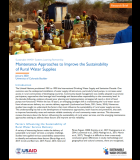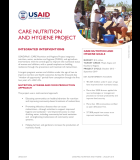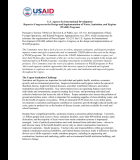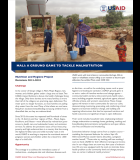In the center of Simaye village in Mali’s Mopti Region, men, women, and children gather under a large tree to listen. Two USAID-trained facilitators discuss the health challenges facing the village. Only three latrines serve many families, so more than half of the people are practicing open defecation; the water point no longer functions, so most families are pulling dirty water from the river; many of the infants and young children are not benefitting from exclusive breastfeeding or a diversified diet, so they are malnourished.
Holding a glass of clear water and pointing to feces on the ground, the facilitators paint a clear picture of the health risks associated with leaving feces in the open — contaminated drinking sources, diarrheal disease, and poor outcomes for children and their families. Their objective: to trigger a sense of disgust, a determination in the community to control their own health and well-being, and to set in motion plans and solutions to create open defecation free (ODF) communities through a process known as community-led total sanitation (CLTS).
Click here to read the full article in USAID's Global Waters magazine.






